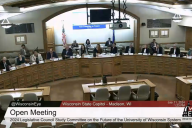You have /5 articles left.
Sign up for a free account or log in.
An ambitious college affordability plan released by the Center for American Progress Wednesday would aim to guarantee that no student has to borrow to pay for their education.
Unlike other notable free college or debt-free college proposals, the plan, dubbed "Beyond Tuition," would impose quality standards on institutions to ensure they address disparate outcomes for students of color, low-income students and other nontraditional groups.
And the CAP plan would provide up to $10,000 a year for costs not related to tuition and fees such as housing, food and transportation.
It proposes that families earning up to 150 percent of the federal poverty level, about $38,000 for a family of four, would have tuition and fees covered at a public university. Above that threshold, families would make contributions as a share of their income. The plan would be funded through a federal-state matching grant; although the state match would vary, the federal government would cover on average 70 percent of the costs in a given state.
In contrast to other college affordability plans, the CAP proposal would include students attending nonprofit private colleges, although students attending those institutions would be expected to make a higher family contribution, as would students attending public institutions out of state. For-profit colleges would be excluded from Beyond Tuition, although they would maintain existing access to federal aid under the proposal.
“It is well past time for a bold, targeted investment in our higher education system,” said Ben Miller, the senior director for postsecondary education at CAP. “For too long, a college degree has been out of reach, particularly for underrepresented students. This plan seeks to close persistent race and income gaps in college access and completion; address historic and systematic inequity in our higher education system; and ensure that access to higher education in America is not a privilege, but a fundamental civil right.”








